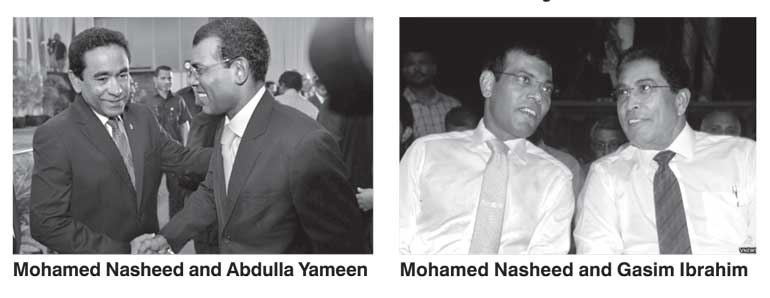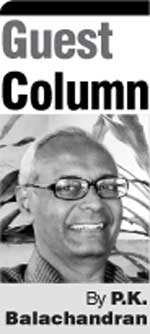Wednesday Feb 18, 2026
Wednesday Feb 18, 2026
Saturday, 27 January 2018 00:47 - - {{hitsCtrl.values.hits}}
With the presidential election due in September this year, Maldivian politics, already very contentious, is getting to be highly volatile.
The Abdulla Yameen Government is going after the opposition with corruption charges and accusations of wantonly tarnishing the image of the country abroad with fabricated information.
The opposition, on its part, is accusing the regime of cynically indulging in, and planning, unfair measures to win the election.
This may be seen as being part and parcel of competitive politics in all young democracies. But what is worrying is that the actions and counter actions have often dragged in, with deleterious effects, the tourism industry, which accounts for 80% of the Maldives’ GDP.
The Government has accused Gasim Ibrahim, leader of the Jumhoory Party, of illegally procuring liquor and pork for his Villa Resorts, and had stopped supply of these critical items. It has made tax claims running into millions of dollars.
For its part, the opposition says that the Government is crippling it by jailing its leaders. The Government is planning to bring a law to make it necessary for candidates to approve the voters’ list. While the Government says that this is for ridding the list of bogus voters, the opposition says that this is regime’s ruse to whet the list to its advantage.
With encouragement from the West, the opposition has also been hyping concerns about the radicalisation of Maldivian Islam under Yameen’s watch. The opposition is accusing the regime of being soft on the issue of Maldivians’ participation in the Islamic State’s war in Syria. Former President Mohamed Nasheed says that the Government is not bothered about the return of an estimated 300 Maldivians who have been fighting for the IS in Syria.
The opposition is seeking the help of the European Union and the UN Human Rights Committee to get the government to enable Maldivian Democratic Party (MDP) leader and former President Nasheed to contest the September 2018 presidential election.

Nasheed had been sentenced to 13 years in prison on terrorism charges but is now in self-exile in the UK. While the Government wants him to come back and complete his sentence, Nasheed wants to come back, not to be in jail but to contest the presidential election or campaign in it.
Likewise, Jumhoory Party leader Gasim Ibrahim, who had been jailed for three years for bribery but was allowed to go abroad for medical treatment, is now in self-exile in Germany. He would like to come back but not to complete his term in prison.
Both Nasheed and Ibrahim consider themselves to be victims of a political witch hunt. Nasheed’s trial is considered by the US-led international community to be flawed and Ibrahim’s company Villa Resorts has said that the $ 188 million claim on it by the Government is baseless and that there are no outstanding dues at all.
The Maldivian Inland Revenue Authority (MIRA) has filed suit for MVR 75 million ($ 4.8 million) against Ibrahim’s Villa Shipping for tax evasion. Claims from previous law suits against five of the Villa group companies amount to $ 166 million. These cases are in court.
The Government had earlier seized islands and lagoons previously leased to Ibrahim’s Villa group.
Meanwhile, former Maldivian Vice President, Ahmed Adeeb, who is in jail in the case relating to the bomb attack on President Yameen in 2016, has accused Yameen of instigating the violence on May Day in 2015 with an intention of getting opposition politician and leader of the Adaalath Party, Sheikh Imran Abdulla, arrested. Accused of instigating terror, Sheikh Imran Abdulla has been in jail for the last 1,000 days.
Yameen’s strategy
Even as he puts the opposition in a spot, President Yameen is going ahead with his ambitious economic development plans to use them as his plank to win the Presidential election.
His “transformational economic strategy” aims at making the Maldives a multi-faceted economy which is not over-dependent on tourism and fishing. The free education system and help to study overseas have resulted in an increasing number of educated and qualified Maldivians who need to be given jobs and investment opportunities. The Maldivian economy has to diversify and undergo technological upgrading to be able to meet the new demands.
 It is for this purpose that the Yameen Government entered into a Free Trade Agreement (FTA) with China. And it was done in a frightful hurry to enable Yameen to use it in the coming election. Maldivian officials say that the Sino-Maldivian FTA will help bring in much needed equipment and service personnel from China to help develop all sectors, including tourism, which has to have the latest facilities.
It is for this purpose that the Yameen Government entered into a Free Trade Agreement (FTA) with China. And it was done in a frightful hurry to enable Yameen to use it in the coming election. Maldivian officials say that the Sino-Maldivian FTA will help bring in much needed equipment and service personnel from China to help develop all sectors, including tourism, which has to have the latest facilities.
However, Yameen’s domestic rivals and international detractors say that the FTA is an outright sell out to China, which will simply take over the Maldivian economy. China-funded mega projects will also drag the Maldives into a debt trap, they say.
According to former President Nasheed, the Chinese have already taken 17 islands as part of a long term “land grab” policy. The opposition is kicking up a shindig over Yameen’s bid to build airports in many of the 1200 islands making up the Maldivian archipelago. Airports will harm the environment the opponents say.
Effect on tourism
But the political fighting and the possibility of violence could adversely affect tourism which accounts for 80% of the country’ GDP.
Tourist arrivals in Maldives decreased to 120,506 in November from 127,986 in October of 2017. There has been a fall in arrivals from China, a new and promising market. Earlier, a global economic downturn had brought down arrivals.
Calling for an end to the use of the tourism industry in domestic political squabbles, Visham Mohamed wrote in the website Avas that Maldivian politicians have been cynically and irresponsibly using tourism to destroy each other.
In 2011, the then Government closed down every spa in the country alleging prostitution because most of these were owned by political rivals, he noted.
“Since then, tourism has remained a tool for politicians, to be held hostage at their whim and narrow political interest.
“The tiny island nation has struggled to shake off tourism boycott calls or anti-tourism campaigns from the globally well-connected opposition. The opposition’s version of international pressure seems to be convincing foreign politicians, diplomats or high profile celebrities to publicly urge the world to boycott the Maldives.
“The incumbent Government has never failed to highlight this fact. It has also repeatedly berated the opposition for using tourism as a political weapon.
“But hypocrisy is never far from our leaders. This week, authorities raided the resorts owned by a key political rival. Apparently four out of the five resorts have acquired pork and alcohol illegally. That may be true. But it is hard to imagine that the action is anything other than a politically motivated attempt to pressure the opposition.
“At a time when most resorts in the Maldives are enjoying near maximum occupancy, uniformed personnel mingling with tourists does not bode too well for the image of a country.
“As the Maldives Association of Travel Agents and Tour Operators (MATATO) aptly said, the negativity surrounding the incident could have far graver consequences for the country’s economy. The media coverage of this incident gives an ominous message to tourists who have booked their trips to the Maldives, MATATO lamented.
“The Government recently announced its intention to spend MVR 100 million ($ 6.4 million) on tourism promotion this year. But the best thing it could do for tourism and boost arrival numbers is to stop muddying it with our dirty politics. Same goes for the opposition. Leave our delicate tourism out of politics, please,” Visham Mohamed wrote.